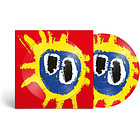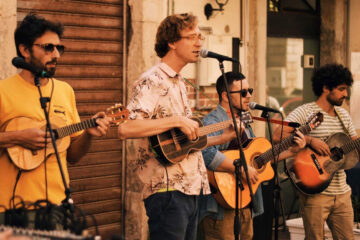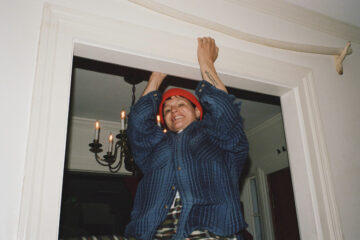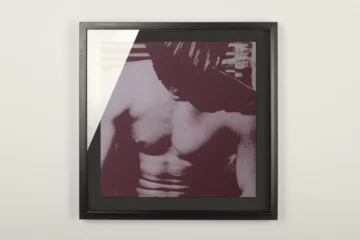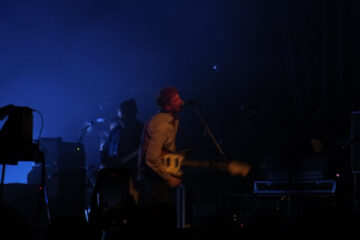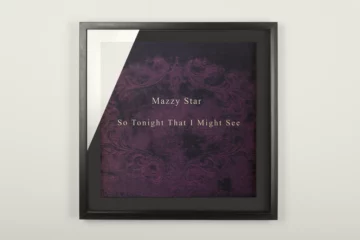»We wanna get loaded. We wanna have a good time« – that’s what the intro to »Loaded« says. And please, no one should come along later and claim that Primal Scream have kept their mission under wraps. Let’s take a brief glance: It’s 1990, Primal Scream have released two LPs full of well-intentioned indie sound. There is no trace of revolution or significance in it. Their participation in the NME’s »C86« compilation almost put the shroud over the band: They were part of a youth movement (Brit indie), but it was stale and OUT just a few months after their appearance. In Glasgow, in London, in Birmingham, or Liverpool, many bands sounded like that. Meanwhile, in Manchester, the real music was playing. And this music was called HOUSE.
»It is a new day. We are together. We are unified, …« (Come Together)
The Haçienda in the old industrial city was probably the only real club in the entire United Kingdom. As early as 1987, the kids who were worth their salt danced here to the sound that was usually played by the Hot 5 at WBMX in Chicago – and no longer drank themselves into a coma, but rather expanded their senses. They took ecstasy and LSD. Acid House, of course named after the lysergic acid that was easily put on the tongue, also turned Primal Scream on. Bobby Gillespie, Robert – who everyone just called Throb – and Andrew Innes were no stay-at-homes and had probably already taken truckloads of speed into their bodies by then.
But the multi-toxic rush finally opened the floodgates: Innes deserves the credit for asking the super-talented DJ Andrew Weatherall for a remix. Weatherall liked the band: until his death in 2020, he was open to all kinds of music, from techno to industrial, indie to grunge. With Gillespie, he talked for hours about dub reggae. He accepted the commission, and from the original »I’m Losing More Than I’ll Ever Have« he formed a remix near to the original but with kick drum. The band, however, was unhappy. Innes became clear: »JUST FUCKING DESTROY IT!«
No sooner said than done: »Loaded«, as the remix was later called and as such also ended up on »Screamadelica«, now dispensed with Gillespie’s vocals, with all the indie shit, with everything Primal Scream had stood for until then, and instead gave her shakers, a proper beat, a dubby-mellow groove that seems almost audacious today, something unspecific. Something that all the guitar rockers didn’t know, in spite of the wall of sound, punk and shoegazing: Abstract feelings instead of concrete stories and images.
The way a genre was thought of had fundamentally changed. Rock music could now be clubby – and club music could be rock.
Now the story could have ended there. Primal Scream pick up their guitars again, look back on their expedition with kind of satisfaction, and are happy about reaching No. 16 in the UK charts. Possibly Primal Scream would be then as unknown as the Close Lobsters nowadays – like who? Exactly!
But manager Alan McGee, the smart guy behind Creation Records and oldest friend of Bobby Gillespie, as well as the band, Weatherall, everyone understood that something had happened here that had perhaps only happened two or three times before in pop history: the way a genre was thought of had fundamentally changed. Rock music could now be clubby – and club music could be rock.
Weatherall was hired to oversee the forthcoming album as producer; no one responded to his argument that he had never done anything like that before. Nor, to be honest, did Weatherall. Nevertheless, the work on “Screamadelica” lasted two years: Gillespie, Innes and Throb did a lot of partying. McGee wrote in his memoirs »Riot, Raves and Glory«: »Basically they were only able to work two days a week, Wednesday and Thursday. They partied from Thursday night to Sunday […] A two-day week!«
Primal Scream capture this phase between Sunday and the next party quite fantastically on the ninth song of the record, »I’m Coming Down«. Over organ vibrato and saxophone, Gillespie sings about coming down, drifting, being alone. At the same time, someone is drumming the bongos in the back, someone is playing the keyboard in another corner and the saxophonist is also in the room: today we call it after-hours. Sure, everyone is psyched, but just chilled out enough not to go crazy.
Before the »Come Down«, however, there are a few minutes of madness. The record opens with this »Faith George Michael sound«, with gospel, with a radiant pop number called »Movin’ On Up«, which has long hidden the fat party in the piano riff and the bass groove. The two singles »Don’t Fight It, Feel It« and »Higher Than The Sun« (produced by The Orb!) already anticipate the crazy rave nineties and sound like Fatboy Slim and Paul Oakenfold – only cool.
Yes, of course, Nirvana’s »Nevermind« was released the same day or so – but there are still good reasons to call »Screamadelica« the more influential record of 1991. Humanity had been shown a new world, one in which people celebrated instead of destroying themselves (even if Primal Scream were also incredibly good at it), one in which people experienced something together and didn’t just listen to it alone in their room. Grunge was big, techno ultimately bigger. No sooner than a whole decade later, the first great depression would set in. But it was kicked off by a fucking guitar band from the depressing, grey, raw and dangerous City of Glasgow.
